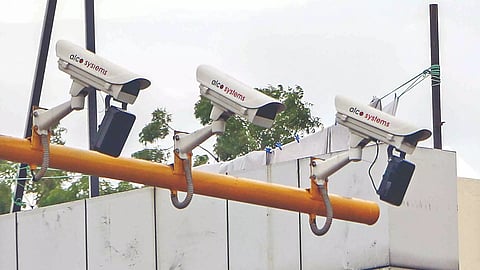

CHENNAI: Come Saturday, motorists on city roads will have to be mindful of the speed at which they are travelling, with the Greater Chennai City Police announcing speed limits for different categories of vehicles. Flouting this would come at a price, ranging from Rs 1,000 to Rs 2,000 as per the revised spot fines for traffic violations.
Incidentally, the decision to implement the maximum speed limit in the city has come at a time when the data released by Union Road Transport Ministry revealed that nearly 9 out of 10 accidents in Tamil Nadu were caused by overspeeding. That is, if the very real risk of injury and even death is not enough to stop motorists from speeding, perhaps pinching their pockets might do the trick.
As per the notification, light motor vehicles (cars) can go at a maximum speed of 60 km per hour (kmph) while two-wheelers can go up to 50 kmph. Heavy motor vehicles have to stick to a maximum speed of 50 kmph and auto-rickshaws to 40 kmph.
But in residential areas, all categories of vehicles should go at 30 kmph or less. “We are trying to evolve a system where technology meets regulation. The Automatic Number Plate Reading (ANPR) cameras will be calibrated according to the vehicles and speed limit, and they will detect violators,” city police Commissioner Sandeep Rai Rathore told DT Next.
Defending the decision to allow cars to ply at a higher speed than other vehicles, he said, “The safety aspect was taken into consideration to give two-wheelers a speed limit less than that of cars.” Also, compared to cars, two-wheelers have a lesser capacity engine, Commissioner Rathore added.
According to traffic police, implementing the speed limit is a key factor to ensure road safety in Chennai, especially because overspeeding not only affects the violators but other road users as well.
Around four months ago, the city police had decided to implement the existing speed limits. However, this led to objections from the public, as the maximum permissible speed, fixed 20 years ago, was 40 kmph for LMVs and two-wheelers, 35 kmph for heavy vehicles, and 25 kmph for autos.
Following complaints that the limits were outdated, a six-member committee was formed under the Additional Commissioner (Traffic) to revise the speed limits. At an advisory meeting, the committee headed by Additional CoP R Sudhakar did a comparative study of major Indian cities – Mumbai, New Delhi, Bengaluru, Hyderabad, and Kolkata – by analysing factors such as speed limit and the number of road accidents.
Experts from IIT-Madras and IRTE, Faridabad were roped in to discuss the technicalities of speed limit fixation depending on the traffic system and road design. The team analysed factors like the type of vehicles and the type of roads in Chennai to arrive at speed limits for different vehicle types.
As per the revised spot fines for traffic violations, in the case of two-wheeler or light motor vehicles, motorists will be fined Rs 1,000 for violating speed limit, while those driving medium or heavy motor vehicles (goods and passenger vehicles) will be fined Rs 2,000.